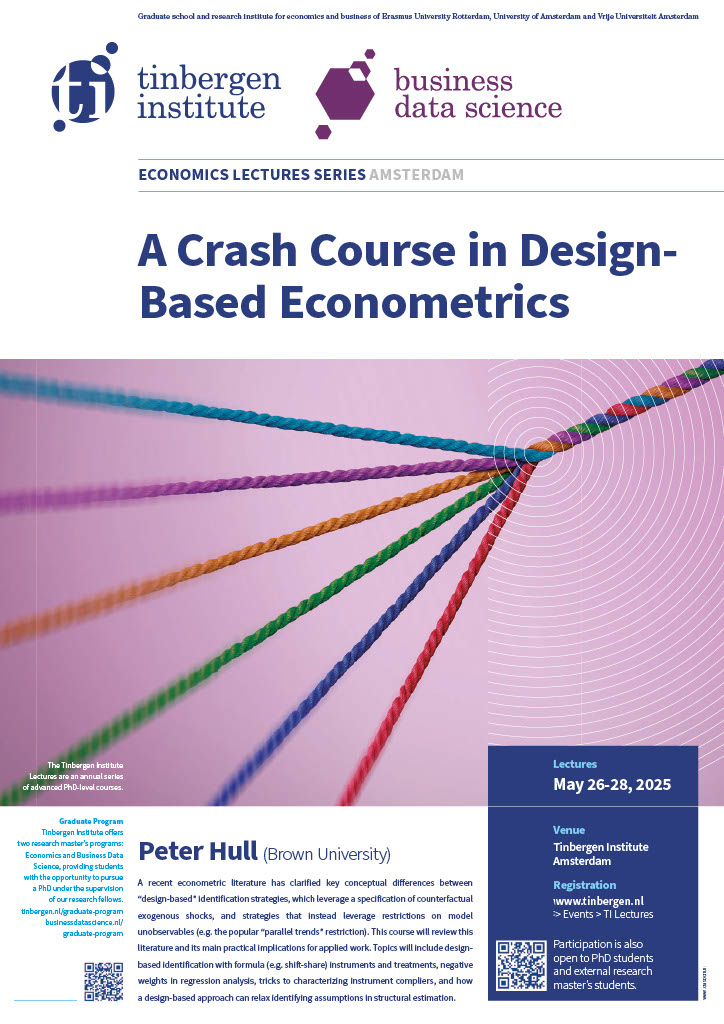TI Economics Lectures 2025
The Tinbergen Institute Lectures are an annual series of advanced PhD level courses. Participation is also open to PhD students and external research master's students.
Peter Hull, Professor of Economics at Brown University, United States will give the TI Economics Lectures 2025. Date: May 26-28, 2025
The topic of the 2025 TI Economics Lectures is: A Crash Course in Design-Based Econometrics.
Title: A Crash Course in Design-Based Econometrics
A recent econometric literature has clarified key conceptual differences between “design-based” identification strategies, which leverage a specification of counterfactual exogenous shocks, and strategies that instead leverage restrictions on model unobservables (e.g. the popular “parallel trends” restriction). This course will review this literature and its main practical implications for applied work. Topics will include design-based identification with formula (e.g. shift-share) instruments and treatments, negative weights in regression analysis, tricks to characterizing instrument compliers, and how a design-based approach can relax identifying assumptions in structural estimation.
Peter Hull received his PhD in Economics from MIT in 2017 and came to Brown in 2021 after working as an Assistant Professor at the University of Chicago, a Research Fellow at the Becker Friedman Institute, and a Postdoctoral Researcher at Microsoft Research New England. He is a labor economist with research interests in applied econometrics, education, healthcare, and discrimination. He is a Faculty Research Fellow in the National Bureau of Economics programs in Labor Studies and Health Care, an Affiliated Faculty Member at MIT Blueprint Labs, and a Research Network Affiliate of CESifo. He is also editor at the Review of Economics and Statistics.
Professor Hull works on developing new econometric methods for measuring quality across different institutions (such as schools, hospitals, and insurance plans) as well as inequality in high-stakes decision-making (such as pretrial release or lending decisions). Much of this work leverages quasi-experimental assignment in an instrumental variables framework. Professor hull has also developed new frameworks for leveraging such quasi-random shocks in settings with complex non-random shock exposure.
Registration
Participation is free of charge for students enrolled in Tinbergen Institute's Research Master's programs in Economics and Business Data Science, as well as for Research Master's students, PhD students, and faculty from the affiliated schools (ESE-EUR, ASE-UvA, ABS-UvA and SBE-VU). Tuition fees apply for external participants:
External (PhD) students and Faculty: €500
External/professional: €1000
External students and participants who want to take the exam and earn credits will be registered in OSIRIS. Note that it is the student’s own responsibility to get these credits registered at a university other than Erasmus University.
Registration is now closed.
Deadline for registration: April 25, 2025.
If you have any question concerning registration, please contact tinbergen@tinbergen.nl.
Venue
On campus at Tinbergen Institute Amsterdam.
Lecture schedule will be shared with the participants closer to the Lectures.
Aiming for a PhD Trajectory?
Tinbergen Institute also offers research master programs in Economics and Business Data Science with the prospect of PhD opportunities under the supervision of our research fellows. Admissions for both programs are open.
